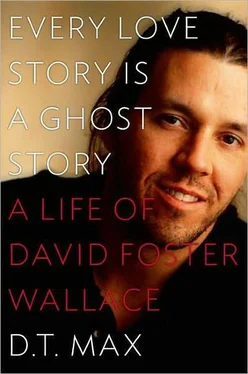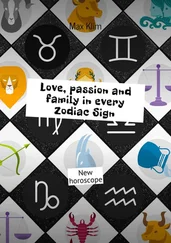As in “Lost in the Funhouse,” “Westward” alternates the seductive rhythm of realist narrative with authorial interruptions meant to remind the reader that the story is a fabrication. But Wallace then takes his writing to the next metalevel, striving to outdo “the locutionally muscular and forever terrible enfant ” Barth. Thus one intrusion, billed as “A Really Blatant and Intrusive Interruption,” reads:
If this were a piece of metafiction, which it’s NOT, the exact number of typeset lines between this reference and the prenominate referent would very probably be mentioned, which would be a princely pain in the ass, not to mention cocky, since it would assume that a straightforward and anti-embellished account of a slow and hot and sleep-deprived and basically clotted and frustrating day in the lives of three kids, none of whom are all that sympathetic, could actually get published, which these days good luck, but in metafiction it would, nay needs be mentioned.
And he adds one last trill at the end. In the final pages, Nechtr himself becomes a writer of the story of two characters named Dave and Gale. Gale — changed to L in the published version—“is self-conscious, neaurasthenic, insecure, moody, diffracted,” the narrator notes. “Dave is introverted, self-counseled and tends to be about as expressive as processed cheese.” They love each other but battle constantly:
When the hottest darkest mood in L — s weather collides with his cold white quiet, they have violent arguments that seem utterly to transform them…. They scream and fight and carry on like things possessed.
But in the climactic fight, the Gale figure stabs not Dave, but herself, “which makes her climactic lover’s thrust at him sort of perfect in both directions.” It is the ultimate metafictional act, not homicide but suicide. (Wallace would say that one of the problems of metafiction is that there is no difference.) For good measure, it is a death the David figure watches not directly but in the “dead green eye” of his TV.
L— dead, “Westward” ends with a proffer of peace to the reader:
See this thing. See inside what spins without purchase. Close your eye. Absolutely no salesmen will call. Relax. Lie back. I want nothing from you. Lie back. Relax. Quality soil washes right out. Lie back. Open. Face directions. Look. Listen. Use ears I’d be proud to call our own. Listen to the silence behind the engines’ noise. Jesus, Sweets, listen . Hear it? It’s a love song.
For whom?
You are loved.
Few readers have taken Wallace up on this offer, and with reason. “Westward” feels like watching a family fight, worse because it is only the son who wants the combat and it may be himself he really wants to wound. The story is as much an attack on the work Wallace had done at Arizona with its mix of postmodern styles as it is on Barth. Wallace’s quintessentially metafictional mind is searching for something to move on to — but nothing is yet present. In its absence the story careers along like the car its MFA students ride in, endlessly, fitfully, and compulsively, battling the readers’ needs. But the story is also evidence of how readily at the time Wallace was seeing connections around him — between love and addiction, and storytelling and advertising, for instance — beginning to put together a worldview that would be fundamental when he turned his attention to Infinite Jest a few years later. Foremost is the idea he debuted in his Arizona stories that our passions are no longer our own. In the age of media, we are nothing but minds waiting to be filled, emotions waiting to be manipulated. There is a sense — again brought to full boil in Infinite Jest —that our obsession with being entertained has deadened our affect, that we are not, as a character warns in that book, choosing carefully enough what to love. And “Westward” suggests for the first time in Wallace’s fiction that not just he but his whole generation share this difficulty. He begins to take the key step of universalizing his neurosis. This is a tricky pass — Wallace hardly had a normal relationship with television, let alone life — but it is the very intensity of his engagement that seems to permit it. The potential payoff artistically was huge, and Wallace was beginning to organize his brief. The characters, the narrator tells us, are members of “ this awkwardest of post-Imperial decades , an age suspended between exhaustion and replenishment, between input too ordinary to process and input too intense to bear.” 4“Westward” also represented how seriously Wallace had come to take fiction, how much he believed that in the wrong hands it could demoralize and passify the unwary.
At Yaddo Wallace was under considerable pressure to be done with his story collection — from his publisher, and from himself. He was working all the time and with a passion others noticed. Most writers spent the mornings in their rooms writing, and the afternoons lounging by the pool or going on outings. Wallace wrote always and everywhere: stretched out on the floor or wedged into an alcove or late at night. “I’ve never been in a work environment this powerful before,” he explained to JT in a postcard. An older writer warned him that his working so hard was unsightly — or so he told Mark Costello.
At the same time, he was aware of the opportunity Yaddo offered to meet other writers and networked enthusiastically. To this new group of colleagues, he brought his odd blend of arrogance and politeness, calling everyone “Mr.” or “Ms.” until told to do otherwise. Some of the other writers thought he was being ironic; the more prescient spotted him as midwestern, or just socially challenged. He was voluble at dinner and active on the tennis courts, where he beat Jay McInerney and lost to Stephen Dunn, a poet who had once been a semiprofessional basketball player. He met an editor from the Paris Review , Jeanne McCulloch, and offered to improve her serve if she would consider his story “Little Expressionless Animals,” which larger magazines kept turning down. He grew infatuated with a young woman composer who was writing a piece using the “devil’s interval”—the augmented fourth musical interval considered so seductive that the church forbade it. In general, he gyrated between wanting to impress and disliking himself for having such impulses, between making his mark as the genius in the room and getting his work done. One day he suggested to another resident, the composer Michael Torke, that they leave behind the chatter of the communal dining room and go for a silent dinner off the grounds to clear their heads, only then to surprise his new friend by bringing along a young woman.
During his stay, Wallace fell under the wing of the thirty-two-year-old McInerney. They would drink together in the evenings and read each other’s manuscripts. McInerney was writing his novel Story of My Life , the memoir of a twenty-year-old socialite and addict named Alison Poole. Wallace admired the older novelist’s control of voice, and also how he could work after a long night of drinking. Wallace liked pot, not alcohol, but he could find none at the retreat so he had to learn to deal with hangovers. The older McInerney was surprised to find Wallace so obsessed with postmodernism; for him and his peers it had largely ceased to matter. “All that tormented stuff about…whether fiction was the world or the word,” he remembers, “it seemed to my generation that Carver and Mary Robison and Tobias Wolff just pushed that question off to the side of the road.” “Forever Overhead” was in second person, and Wallace quizzed McInerney, who had used it memorably in Bright Lights . He made a trip to the Bennington Writers Conference to read at the invitation of Alice Turner, the fiction editor at Playboy , who had been impressed by his stories. They fell to intense talking in the common room — about his writing, her work, other writers. Wallace in the same breath said he was on an MAO inhibitor and refreshed their drinks. Eventually, the two went into a bedroom. Their noise disturbed the other writers, themselves hardly early-to-bed types. In retaliation the novelist George Garrett took Wallace’s boots and socks and hid them under the sink. The next morning Wallace had to read in his bare feet. Deeply embarrassed, he told Garrett, whom he did not suspect, “I hope you don’t think I’m a hippie.”
Читать дальше












